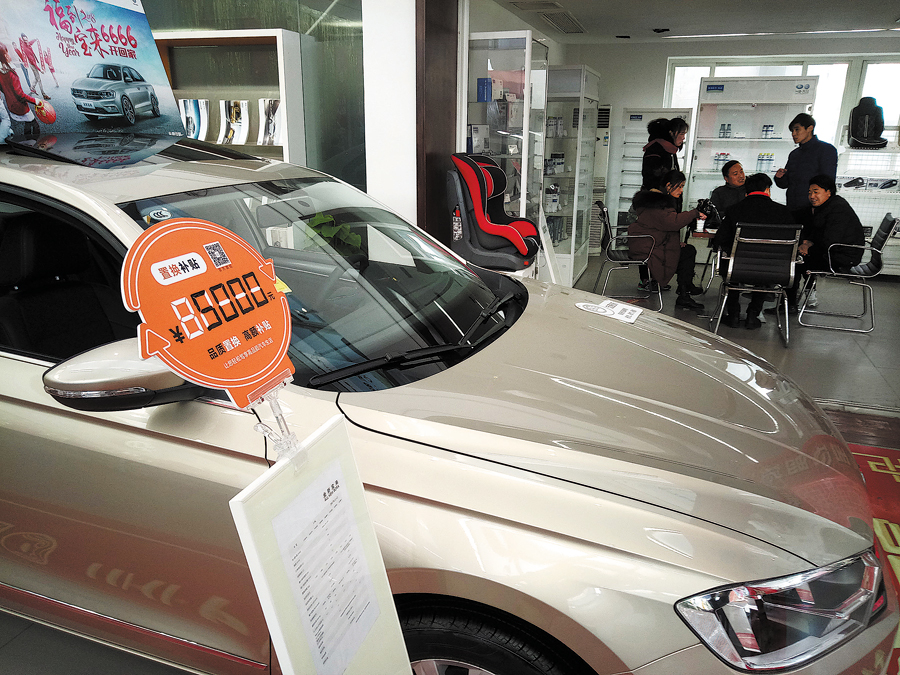China's vehicle sales take a tumble again in September
By Cao Yingying | China Daily | Updated: 2018-10-15 11:18

CAAM official says previous estimate of 3 percent growth for the whole year 'out of the question'
China's huge auto sales market has dropped continuously for the past three months, splitting camps on the direction of the market-with the country's peak industry association saying it still believes there will be minimal growth for the full year, but manufacturers disagreeing.
According to the statistics released by the China Association of Automobile Manufacturers on Friday, vehicle sales in September tumbled 11.55 percent to 2.39 million units compared with same period last year.
Last month, the sales of passenger cars reached 2.06 million, falling 12.04 percent year-on-year. Sales of sedans, SUVs, MPVs and crossovers were the main drivers behind the drop, particularly the crossover vehicles which slumped 21.93 percent year-on-year.
A total of 333,600 commercial vehicles were sold in September, for a decline of 8.39 percent compared with same period last year.
"The sharp decline of September is bigger than expected," said Xu Haidong, an assistant to CAAM's secretary-general, at a news conference on Friday.
Xu added that the result was a combination of factors, including industry capacity cuts, the economic climate, and increasing environmental awareness.
Total vehicle sales in the first three quarters of this year stood at 20.49 million units, up 1.49 percent from the same period last year.
The growth rate fell 2.04 percentage points compared with the first eight months.
Most of auto companies estimate negative growth in sales this year for the industry, while CAAM still sees small growth in light of the current macroeconomy conditions, according to the association.
However Xu said that the association's estimate of 3 percent growth for the whole year, made at the start of 2018, is now out of the question.
"The Chinese auto industry has built a system with an extensive industry chain. The high-speed growth of last two years, driven by the policies and other external factors, set up a high base of sales and overstretched the consumer market," said Shi Jianhua, deputy secretary-general of CAAM.
It is normal for the Chinese auto industry to return to rationality and stability, and the smooth growth was sufficient for the sector's healthy and ordered development and good for car manufacturers to improve the quality of their vehicles and enhance their competitiveness, Shi added.
In addition, the government should retain such policies as cutting 50 percent of the purchase tax for small-displacement vehicles with energy saving and emission reduction functions, which were favorable to the development of the industry, Shi suggested.
Xu said the maintenance of high-speed growth year-on-year in the new energy vehicle sector would also assist the overall auto industry.
Last month, that segment's sales reached 121,200 units, up 54.79 percent compared with same period last year.
Sales as well as production of plug-in hybrid vehicles showcased significant increases, soaring 146.87 percent and 138.04 percent respectively in the first three quarters of this year.
Sales of new energy vehicles totaled 721,500 in the first three quarters, an increase of 81.05 percent year-on-year.
CAAM forecast that sales of new energy vehicles will continue to increase in next three months and exceed 1 million units for the whole year.
China has made efforts to encourage the use of new energy vehicles to ease pressure on the environment, by offering tax exemptions and discounts on car purchases, and remained the world's largest new energy vehicle market for three consecutive years.
Last year, the country sold 777,000 new energy cars.
The charging infrastructure of electric vehicles is also promoted.
According to statistics from the China Electric Vehicle Charging Infrastructure Promotion Alliance, there are now 285,000 electric vehicle charging piles nationwide, including 42,000 charging piles in Beijing and 36,000 in Shanghai.
Analysts said charging infrastructure will continue to be installed in the country and the number of the charging piles is sustaining steady growth month to month.
























